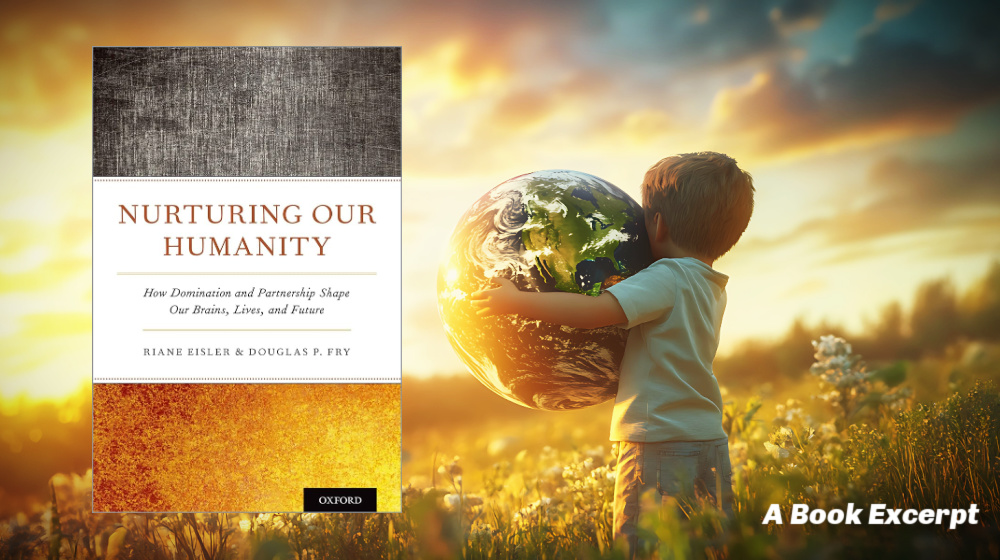Nurturing Our Humanity: By Riane Eisler & Douglas Fry – A Book Excerpt
Chapter 1: Our Story, from Nuturing Our Humanity: How Domination and Partnership Shape Our Brains, Lives, and Future
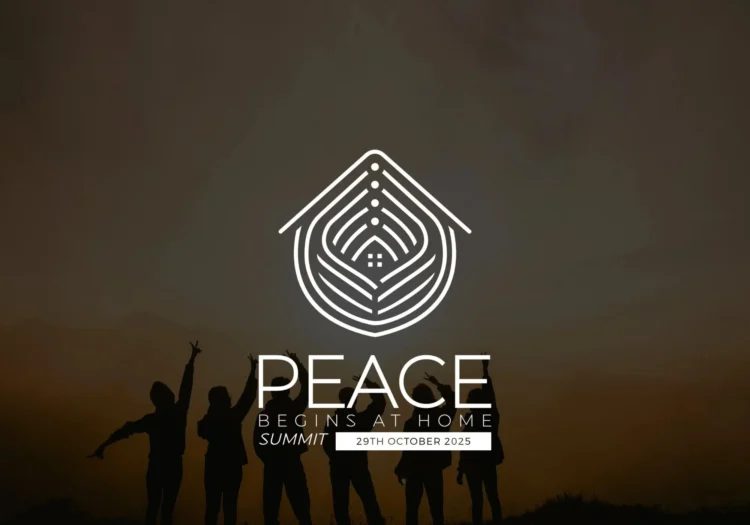 Editor’s Note: The follow exclusive excerpt from Nurturing Our Humanity is shared with permission from the author and publisher. This content is excluded from all forms of open access license, including Creative Commons, and the content may not be reused without the permission of Oxford University Press. Find details of how to obtain permission here.
Editor’s Note: The follow exclusive excerpt from Nurturing Our Humanity is shared with permission from the author and publisher. This content is excluded from all forms of open access license, including Creative Commons, and the content may not be reused without the permission of Oxford University Press. Find details of how to obtain permission here.
To discover how Riane Eisler’s work on Creating Caring Economies intersects with Darcia Narvaez’s work, our Evolved Nest, and how our nonprofit partnerships support one another, watch the recent discussion with Riane, Darcia and Kindred’s editor, Lisa Reagan here, and below.
Learn more about the forthcoming Peace Begins at Home Summit.
Nurturing Our Humanity:
How Domination and Partnership Shape Our Brains, Lives, and Future
By Riane Eisler and Douglas Fry
CHAPTER ONE: Our Story
An Excerpt
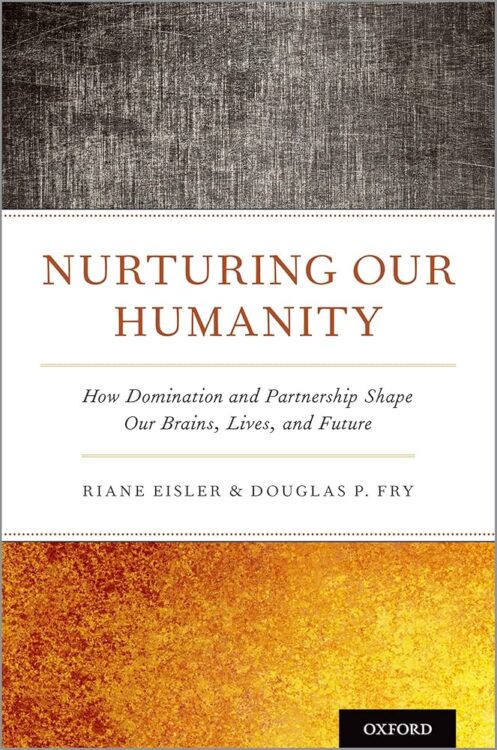
For millennia, humans have imagined a peaceful and just world. Sometimes we only imagined this world in an afterlife. But over the last centuries, many of us have imagined it right here on Earth. Not a utopia, not a perfect world. But a world where peace is more than just an interval between wars, where dire poverty, brutal oppression, insensitivity, cruelty, and despair are no longer “just the way things are.”
Now there is a new urgency to our wish for a more humane world. Every day we are bombarded by news of barbaric human rights abuses, terrorist attacks, proliferation of nuclear weapons, and a drift back to strongman rule. The destruction of our natural environment continues at an accelerating pace, endangering our global life- support systems. New technologies, from artificial intelligence to biological engineering, could have catastrophic results if guided by cultural values of greed, megalomania, and disregard for human rights.
From all sectors— religious and secular, philosophical and scientific, and thousands of small groups worldwide— come calls for cultural transformation: for building a truly humane culture. The pivotal question is whether such a culture— one that supports rather than inhibits human well- being and our capacities to love, create, and prosper— is possible.
Nurturing Our Humanity offers extensive evidence that we can construct this humane culture. Based on findings from both biology and social sciences, we today know that the cultural environments we create affect nothing less than how our brains develop and hence how we think, feel, and act. But Nurturing Our Humanitytakes bioculturalism further. It examines our cultural environments through a powerful new analytical tool: the Biocultural Partnership – Domination Lens.
Rather than viewing societies through the lenses of familiar social categories, such as religious versus secular, Eastern versus Western, rightist versus leftist, or capitalist versus socialist, which only describe a particular aspect of society, the Biocultural Partnership – Domination Lens uses two larger cultural configurations at opposite ends of a continuum: the partnership system and the domination system. This broader frame makes it possible to identify the conditions that support the expression of our human capacities for caring, creativity, and consciousness or, alternately, for insensitivity, cruelty, and destructiveness. It upends age-old assumptions about human nature and the supposed impossibility of improving the human condition, showing how we can bring about fundamental change. The new interdisciplinary perspective of the Biocultural Partnership – Domination Lens reveals how cultural beliefs and social institutions such as politics, economics, and education affect, and are in turn affected by, childhood and gender relations; highlights the impact of these early experiences and observations on how our brains develop; and shows how we can use our knowledge of human development to construct equitable and sustainable cultures that maximize human well- being.
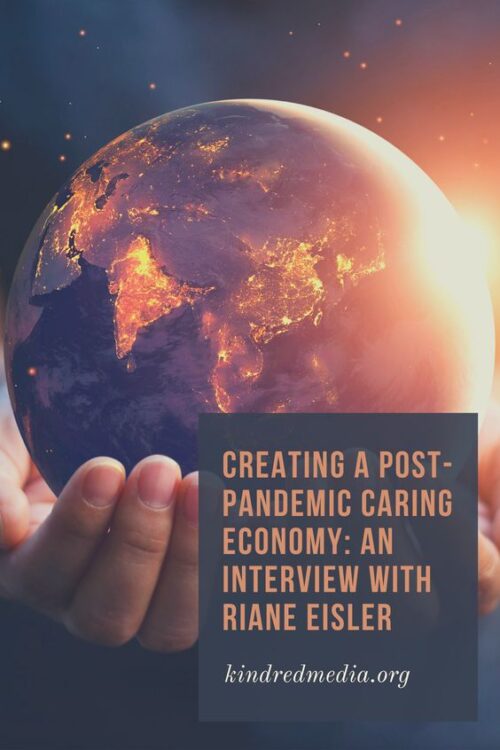 Nurturing Our Humanity re-examines vital matters ranging from sex, love, intimacy, parenting, and romance to human rights, social justice, politics, economics, violence, and values from this integrative perspective. It sheds new light on critical current issues, all the way from climate change, scapegoating, authoritarianism, racism, and other forms of in- group versus out- group thinking to contemporary disputes about biological and cultural evolution, economics, national and international politics, religious fundamentalism, and the uses and potential abuses of technological breakthroughs.
Nurturing Our Humanity re-examines vital matters ranging from sex, love, intimacy, parenting, and romance to human rights, social justice, politics, economics, violence, and values from this integrative perspective. It sheds new light on critical current issues, all the way from climate change, scapegoating, authoritarianism, racism, and other forms of in- group versus out- group thinking to contemporary disputes about biological and cultural evolution, economics, national and international politics, religious fundamentalism, and the uses and potential abuses of technological breakthroughs.
We explore how our capacities for caring, creativity, and consciousness go way back in evolutionary time and are integral to human nature, and we show that there have been, and continue to be, cultures that orient to the partnership side of the continuum. We look at how domination systems produce high levels of stress — from stressful early family experiences to the artificial creation of economic scarcity — and how this plays out in the neurochemistry of the brain, tending to keep people at a less advanced level of overall human development that interferes with the full flourishing of those very qualities that make people happiest: security, empathy, consciousness, creativity, and love. On the other hand, partnership-oriented environments — as illustrated by conditions in contemporary societies ranging from the Minangkabau in Southeast Asia to European Nordic nations— enhance the expression of our human capacities…
Covering a wide swath of prehistory and history, we take a fresh look at many conventional assumptions about religion and science. We see, for example, how Western science came out of a hierarchical, conformist, misogynist, all male medieval clerical culture (a world without women and children) and how it took more than 700 years for women’s, men’s, and gender studies to emerge in universities; how Freud’s secular theories replicated the earlier religious ideology of original sin and male supremacy; and how in all spheres (from the family, politics, and the academy to mainstream and popular culture worldwide), the underlying tension between movement toward partnership and the resistance/ regressions to domination has played out over millennia.
Partnerism and the Evolved Nest: A Powerful Discussion with Riane Eisler and Darcia Narvaez
“We are stuck in the wrong story.” — Riane Eisler
“The Evolved Nest helps us remember what being human really means.” — Darcia Narvaez
(from the recorded conversation below)
In this powerful conversation, Riane Eisler and Darcia Narvaez explore the synergy between Eisler’s Partnerismframework and Narvaez’s Evolved Nest model. Narvaez’s and Eisler’s lifelong scholarly works intersect in their call for a shift towards nurturing, relational, and balanced models of existence that revalue the feminine and kinship bonds, seeing these as essential for creating a sustainable, compassionate future. Their work advocates for a profound cultural transformation, grounded in the rediscovery of ancient values and practices that honor interconnectedness and the sacredness of all life.
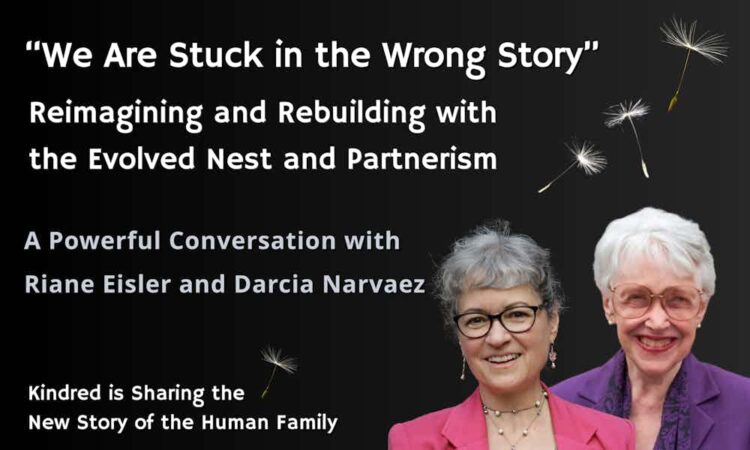 In defining the complimentary relationship between the Evolved Nest and Partnerism, Riane points out in the video below that alloparenting, one of nine key components of our Evolved Nest, isn’t possible without economic shifts toward gender parity and valuing caregiving. Her insight provides critical guidance for cultural creatives and Nesting Ambassadors who may risk burnout in an effort to create a modern village based on a Cycle of Cooperative Companionship in a decaying culture based on a Cycle of Competitive Detachment. While Narvaez’s work restores our baselines for typical species wellbeing, Eisler’s work expands practical guidance/insights that protect activists from entering into draining Hamster Wheel Activism (acting unconsciously from the Dominant Worldview to engender social change).
In defining the complimentary relationship between the Evolved Nest and Partnerism, Riane points out in the video below that alloparenting, one of nine key components of our Evolved Nest, isn’t possible without economic shifts toward gender parity and valuing caregiving. Her insight provides critical guidance for cultural creatives and Nesting Ambassadors who may risk burnout in an effort to create a modern village based on a Cycle of Cooperative Companionship in a decaying culture based on a Cycle of Competitive Detachment. While Narvaez’s work restores our baselines for typical species wellbeing, Eisler’s work expands practical guidance/insights that protect activists from entering into draining Hamster Wheel Activism (acting unconsciously from the Dominant Worldview to engender social change).
Together, Eisler and Narvaez show that healing our world begins with changing how we raise children, support families, and reimagine human society. Lisa Reagan contextualizes the conversation by highlighting Kindred’s nonprofit mission to author a New Story of the Human Family, and to expose the bio-cultural conflict families face: an engineered, trauma-inducing non choice between our biological needs for nurturing and our economic need for survival. This discussion moves us closer to creating coherence for a New Story of the Human Family, exploring relevant and urgent questions like:
Can we create the village in a capitalist culture? Can we create a village that centers the needs of the child, our Evolved Nest, just for the time we are parenting? Where do we begin? asks Lisa Reagan in the video. (All of Kindred’s posts, podcasts, resources, and free materials are dedicated to answering that last question.)
 In response to how the Evolved Nest and Partnerism complement each other, Narvaez says, “What the Evolved Nest adds to Partnerism is the move away from anthropocentrism and towards partnership with the rest of nature, with the plants, animals, the waterways, the mountains, with the cycles of the Earth, and not just thinking about human needs and interests, but that we are part of Earth. We are Earthlings and to have that kind of consciousness.”
In response to how the Evolved Nest and Partnerism complement each other, Narvaez says, “What the Evolved Nest adds to Partnerism is the move away from anthropocentrism and towards partnership with the rest of nature, with the plants, animals, the waterways, the mountains, with the cycles of the Earth, and not just thinking about human needs and interests, but that we are part of Earth. We are Earthlings and to have that kind of consciousness.”
“And if you read Marx or Adam Smith there is nothing about caring for nature because that is feminine, right? In their view, nature is there for one thing: to be exploited,” replies Eisler. “Today, of course, we are in a period of regression worldwide towards domination. But at the same time there are thousands, or millions, of small groups working on partnership in one way or another. But we lack the frame: the emphasis on family and gender.” (Timemark 14:30)
The deep discussion in this podcast, exploring Eisler’s caring economy components (Partnerism) and Narvaez’s neurobiological pathway to wellbeing (Evolved Nest) is one aspect of the ongoing nonprofit partnership between the Evolved Nest Initiative (Kindred World) and the Center for Partnership Systems.
Kindred World was founded 25 years into America’s 50 year slide to the bottom of all international wellness indicators. Kindred World’s trance-breakers, wayfinders, and new cycle makers champion a growing consciousness-raising movement dedicated to Welcoming a Wisdom-based, Wellness-informed World. Read more about our award-winning advocacy, initiatives, and statements of impact here.


